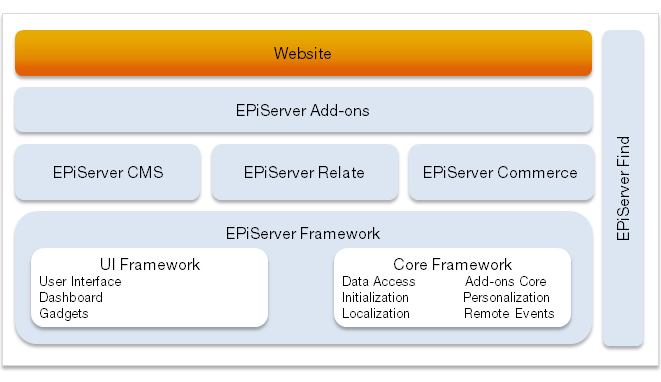Architecture
Introduction
This document describes the architecture of the EPiServer platform, with an introduction to the system foundation and related components.
Overview
The image below provides an overview of the EPiServer platform, with the EPiServer Framework and products EPiServer CMS, EPiServer Relate (Community) and EPiServer Commerce as integrated parts.

The platform offers shared features such as global system access and search through the OnlineCenter, the Add-on Store for easy-access to modules and upgrades, and the EPiServer Find search module for the creation of advanced search based site navigations.
EPiServer Framework
The EPiServer Framework contains components for the core framework and the pluggable user interface of EPiServer.
UI Framework
- User interface based on the Dojo Javascript framework, making it possible to create specific plugins/widgets for integrated systems.
- Personalized dashboard where users can add gadgets of their own choice.
- EPiServer comes with a number of default gadgets, and you can aslo develop your own specific gadgets.
Core Framework
- Data access through Dynamic Data Store (DDS), providing an API and infrastructure for saving, loading and searching of data.
- A central initialization system managing initialization of both internal code, as well as third-party and custom modules.
- A localization API providing flexible localization services for managing localized strings throughout the application.
- The add-ons core for managing components, both by EPiServer and third-parties, to extend the functionality of EPiServer.
- The personalization feature allows for the management of visitor groups, which are then used to create personlaized content on websites.
- Remote events/li>
Technical Foundation
The EPiServer platform is built upon these components and frameworks:
- Microsoft .NET Framework and ASP.NET
- Javascript and Dojo toolkit
- Microsoft Windows Workflow Foundation
- Microsoft Windows Communication Foundation
- Microsoft Windows PowerShell
- Virtual Path Providers (VPP)
See Also
Refer to the following sections in this documentation to find out more about each area:
- Add-ons
- Dynamic Data Store
- Localization Service
- OnlineCenter section with gadget development
- Powershell for EPiServer Applications
- User Interface section with descriptions of Dojo based components and the REST Datastore
- Virtual Path Providers
- The EPiServer CMS SDK for more information on features such as initialization and event management
Last updated: Mar 21, 2013
